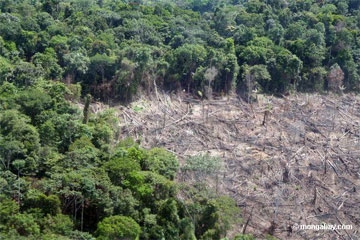California joins effort to fight global warming by saving rainforests
mongabay.com
November 19, 2008
|
|
California has joined the battle to use rainforest conservation to fight global warming.
In an agreement signed yesterday at a climate change conference in Beverly Hills, California, Governor Arnold Schwarzenegger pledged financial assistance and technical support to help reduce deforestation in Brazil and Indonesia. The Memorandum of Understanding commits the California, Illinois and Wisconsin to work with the governors of six states and provinces within Indonesia and Brazil to help slow and stop tropical deforestation, a source of roughly 20 percent of global greenhouse gas emissions. The governors include Governor Antônio Waldez Góes da Silva of Amapa, Brazil; Governor Eduardo Braga of Amazonas, Brazil; Governor Blario Maggi of Mato Grosso, Brazil; Governor Ana Júla de Vasconcelos Carepa of Para, Brazil; Governor Yusof Irwandi of Aceh, Indonesia; and Governor Barnamas Suebu of Papua, Indonesia.

|
The deal is the first state-to-state, sub-national agreement focused on reducing emissions from deforestation and land degradation (REDD) programs. Governor Schwarzenegger's office says the agreement will "focus on improving forest carbon accounting methodologies and will work to link state greenhouse gas mitigation programs with REDD efforts in Brazil and Indonesia".
"Tropical deforestation accounts for 20 percent of all human-caused carbon emissions in the world, and the governors signing these MOUs with us manage more than 60 percent of the world's tropical forest lands," Governor Schwarzenegger said. "With this agreement, we are focusing our collective efforts on the problem and requiring our states to jointly develop rules, incentives and tools to ensure reduced emissions from deforestation and land degradation. We are also sending a strong message that this issue should be front and center during negotiations for the next global agreement on climate change."
The agreement commits the signatories to reducing greenhouse gas emissions from deforestation and land degradation while increasing additional carbon sequestration through reforestation and improved forest management practices; jointly developing rules to ensure that forest-sector emission reductions and sequestration will qualify under criteria in California's proposed climate change legislation; and develop a plan to monitor progress of the initiative.

|
The Brazilian and Indonesian governors represent states and provinces that account for the bulk of current tropical forest loss. Forest clearing in Indonesia is primarily driven by logging and agricultural expansion — particularly for oil palm plantations. In Brazil leading causes of deforestation include land speculation, expansion of cattle pasture and industrial soy farms, logging, infrastructure development, and colonization schemes. In both countries these activities are contributing to fires that damage or destroy vast tracts of forest on an annual basis.
Governors Braga of Amazonas, Irwandi of Aceh, and Suebu of Papua have previously agreed to ban logging until until a new carbon financing mechanism for forest conservation is in place, a development that is expected to come by the conclusion of the next year's U.N. Framework Convention on Climate Change meeting in Copenhagen, Demark.
REDD is viewed by some economists as one of the most cost-effective ways to reduce greenhouse gas emissions. Experts say the mechanism could eventually lead to the transfer of billions of dollars per year to fund conservation and rural development in tropical countries.
Deforestation and land use change are the second largest source of greenhouse gas emissions from human activities, a larger source than all the world’s cars, trucks, planes, and ships combined.
Text of MOU
ACKNOWLEDGING the friendship and excellent cooperation among the governments of the Federative Republic of Brazil/Republic of Indonesia and the United States of America;
Related articles Despite financial crunch, donors pledge $100M for rainforest conservation (10/23/2008) Donors meeting this week in Washington D.C. pledged more than $100 million to the World Bank’s new initiative for conserving tropical forests. In addition to the $100 million in donations, the World Bank announced that more than forty developing countries have asked to join the Forest Carbon Partnership Facility — the Bank’s foray into the emerging market for forest carbon credits. 25 countries have so far been selected to participate in the initiative, which builds capacity for countries to earn compensation through the carbon markets for reducing greenhouse gas emissions by reducing deforestation and forest degradation (REDD). Experts say the mechanism could eventually lead to the transfer of billions of dollars per year to fund conservation and rural development in tropical countries, while at the same time helping fight climate change. Deforestation and land use change presently accounts for around a fifth of anthropogenic emissions.
Forest conservation can fight climate change and poverty
Cutting deforestation can fight climate change, reduce poverty and conflict |
TAKING INTO ACCOUNT the global nature of environmental problems and the ability of joint efforts to enhance joint policies for environmental protection and sustainable natural resources;
RATIFYING the willingness to promote new mechanisms of dialogue and agreement that lead to the strengthening of relationships and productive mutual action;
CONSIDERING the opportunities for collaboration between the State of Amazonas/State of Amapa/State of Mato Grosso/State of Para/Province of Aceh/Province of Papua, and the States of California, Illinois, and Wisconsin in combating climate change;
Recognizing the importance and value of implementing climate mitigation and adaptation actions at sub-national levels, both in their own right and as a means to furthering national and international efforts;
recognizing further the importance of focusing on issues of common interest between the Parties, such as reducing greenhouse gas emissions in the forest sector by preserving standing forests and sequestering additional carbon through the restoration and reforestation of degraded lands and forest and improved forest management practices;
EXPRESS their willingness to cooperate, in the search of joint actions that improve environmental quality and optimize the quality of life in the State of Amazonas State of Amapa/State of Mato Grosso/State of Para in the Federative Republic of Brazil/Province of Aceh/Province of Papua in the Republic of Indonesia, and the States of California, Illinois, and Wisconsin in the United States of America.
ARTICLE 1
This Memorandum of Understanding is intended to promote broader cooperation regarding environmental issues among the Parties within their respective purview and based on principles of reciprocity, information exchange and mutual benefit.
ARTICLE 2
The Parties will coordinate efforts and promote collaboration for environmental management, scientific and technical investigation, and capacity building, through cooperative efforts focused particularly, but not exclusively, on the following priorities:
a. Reducing greenhouse gas emissions from deforestation and land degradation – otherwise known as “REDD” – and sequestration of additional carbon through the restoration and reforestation of degraded lands and forests, and through improved forest management practices;
b. Developing rules to ensure that forest-sector emissions reductions and sequestrations, from activities undertaken at the sub-national level, will be real, measurable, verifiable and permanent, and capable of being recognized in compliance mechanisms of each party’s state, provincial, regional, national or international programs such as the State of California’s Global Warming Solutions Act (Assembly Bill 32), Midwestern Greenhouse Gas Accord, Western Climate Initiative, Regional Greenhouse Gas Initiative, or other initiatives;
c. Initiating innovative financing between the Parties for the sustainable use of forest resources and biodiversity conservation;
d. Adapting to future climate change impacts and the mitigation of greenhouse gas emissions; and
e. Stimulating investment between the Parties to promote sustainable development.
ARTICLE 3
In furtherance of the priorities referenced in Article 2, the Parties may develop the following methods of cooperation, among others:
a. Exchange of information;
b. Design, implementation and joint financing of studies and projects;
c. Development and dissemination of publications;
d. Technology transfer;
e. Exchange of scholars and experts;
f. Development of capacity building programs;
g. Joint development of seminars, workshops, conferences, courses, technical visits and certificate courses; or
h. Other methods developed between the Parties.
ARTICLE 4
The Parties will cooperate in the development of a Joint Action Plan containing cooperative actions or projects and/or specific studies to be developed.
Each work plan will include all necessary provisions for implementing the cooperation activity agreed upon, including its scope, coordination and administration, resource allocation, expert and professional exchanges, administrative issues, and any other information deemed necessary for achieving the objective of this Memorandum of Understanding.
Independent of the formalization of work plans the Parties agree that collaboration proposals can be presented that allow the parties to optimize outcomes for achieving the objective of this Memorandum of Understanding.
For the follow up and implementation of work plans, theme-specific groups will be established. These groups will be led by officials of the Parties and will meet at a minimum of once a year.
ARTICLE 5
In activities of cooperation and information exchanges, if Parties deem it convenient, private and public sectors may be invited to participate, as well as public, academic and research institutions, or any other organization, as long as they can directly contribute to the achievement of the objective of this Memorandum of Understanding.
ARTICLE 6
The Parties will finance activities referred to in this Memorandum of Understanding with resources allocated in their respective budgets, as these resources become available and as stipulated by their own legislation processes. Each Party will pay for expenses related to its own participation, unless alternative financial mechanisms can be used for specific activities, as appropriate and as approved by their respective appointing authority
ARTICLE 7
Confidential or protected information, material or equipment will not be subject to transfer pursuant to this Memorandum of Understanding.
If information, material and equipment is identified to require or to potentially require protection and classification, during the development of cooperation activities as stated in this Memorandum of Understanding, the Parties will inform corresponding authorities and will establish the appropriate protections in writing. Transfer or use of information, material and equipment not protected or classified which is controlled by any of the Parties, shall be done in accordance with applicable laws of each state, province, nation, or institution and must be properly identified.
ARTICLE 8
Officials designated by each Party to implement cooperation activities under this Memorandum of Understanding will continue working for the party to whom they belong, and no labor relations will be created with any other Party to this Memorandum of Understanding.
Cooperative activities under this Memorandum of Understanding will in no way change the original employer/employee relationship of the officials working together under this Memorandum of Understanding.
The Parties will make all necessary arrangements with corresponding authorities to facilitate customs entrance and exit of participants officially taking part in cooperation projects under this Memorandum of Understanding. These participants will be bound by migration, fiscal, customs, sanitary and national security provisions existing in each respective country and are not authorized to do any other activity without previous permission from the appropriate authorities.
The Parties will ensure that their official representatives participating in cooperation actions have medical, liability and life insurance, to pay costs related to damage repair or indemnification, in case that an accident may occur as a result of cooperation activities related to the execution of this Memorandum of Understanding.
ARTICLE 9
Any differences of interpretation, management or execution of this Memorandum of Understanding will be resolved by mutual understanding of the Parties.
ARTICLE 10
This Memorandum of Understanding can be modified by mutual consent of the Parties in writing, specifying the date of the entry into force of any such modifications.
ARTICLE 11
Termination of this Memorandum of Understanding can be made by any of the Parties, through written communication directed to the other Parties thirty (30) days in advance.
ARTICLE 12
The Parties acknowledge that this Memorandum of Understanding is only intended to provide for cooperation between the Parties, and does not create any legally binding rights or obligations. To the extent any other provision of this Memorandum of Understanding is inconsistent with this paragraph, this paragraph shall control.
Executed in California, United States of America, on November eighteen of two thousand and eight, in one original in the English language.